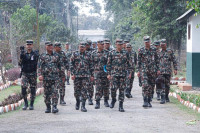National
Private sector for competitive licensing for hydropower projects
A new bill proposes any government entity and a firm having at least 51 percent stake of the government can be allowed to develop a project without competition.
Prithvi Man Shrestha
Private sector hydropower developers have called for removal of the provisions from the Electricity Bill-2023 that allow the government to issue survey and construction licences without competition.
As per the bill registered in Parliament on September 13, any government entity and any entity having at least 51 percent stake of the government can be allowed to develop a project without competition.
Likewise, federal, provincial and local governments can develop any power project individually or collectively without competition.
The bill will also open the door for any government entity or an entity specified by the government to collaborate with foreign government entities or entities specified by foreign governments to develop the projects.
Such entities may be granted licence without competition on condition that the project’s capacity is over 100MW, which requires huge investment and expertise, and helps to create employment, help reduce trade deficit and maintain the balance of payments significantly.
Making public its stance on the bill, the Independent Power Producers’ Association of Nepal (IPPAN) said that the clause allowing the development of hydropower projects without competition should be removed. “The licence for projects, whether identified by the government or the private sector, should be granted only through competition,” it said.
Ananda Chaudhary, vice-president of IPPAN, said that the provision forcing only the domestic private sector to compete for licences is not justified.
“Also, granting foreign firms licence for developing 100MW projects without competition is unjustified because the Nepali private sector itself is capable of developing projects upto 200MW independently,” he added.
He said the threshold for foreign hydropower developers eligible for licence should be fixed at 500MW or storage-type projects.
In recent years, the government has granted licences to foreign firms without competition based on understanding with foreign governments.
For example, India’s SJVN Limited has been granted the licence for developing 669MW Lower Arun without competition. Likewise, the SJVN Limited and the Nepal Electricity Authority were granted approval to develop Arun-4 without competition.
The government-owned Vidyut Utpadan Company Limited and NHPC Limited, an Indian government undertaking, signed a Memorandum of Understanding to develop 480MW Phukot Karnali Hydro Electric Project in Kalikot during Prime Minister Pushpa Kamal Dahal’s visit to India in late May and early June. It is another example of granting approval to develop without competition.
Earlier, the government had already handed over the 750MW West Seti and 450MW Seti River-6 to the NHPC.
In 2017, the then Pushpa Kamal Dahal government awarded the 1,200MW Budhi Gandaki Hydropower Project to China Gezhouba Group without competition, which was later revoked.
Hydroelectricity Investment and Development Company, a government-owned entity, and Power China signed an agreement to develop a 762MW Tamor reservoir hydropower project in 2019.
Likewise, the private sector has also opposed the bill’s provision regarding the basis of the competition for granting licences. According to the bill, the amount of free shares and free electricity offered to the government, amount of upfront payment, annual payment commitment and price of electricity will determine bidder selection for licence.
Such provisions, according to Chaudhary, will make hydropower projects costlier. “If you promise to give more to the government, it will make the project more expensive,” he said. “The question is whether the government wants to make the project costly.”
IPPAN also wants extension of the validity period of project licences. The bill has set the validity period for storage type projects at 45 years while for other types of project at 40 years. And IPPAN wants to extend it to 55 years for storage-type projects and 50 years for other projects.




 20.22°C Kathmandu
20.22°C Kathmandu














